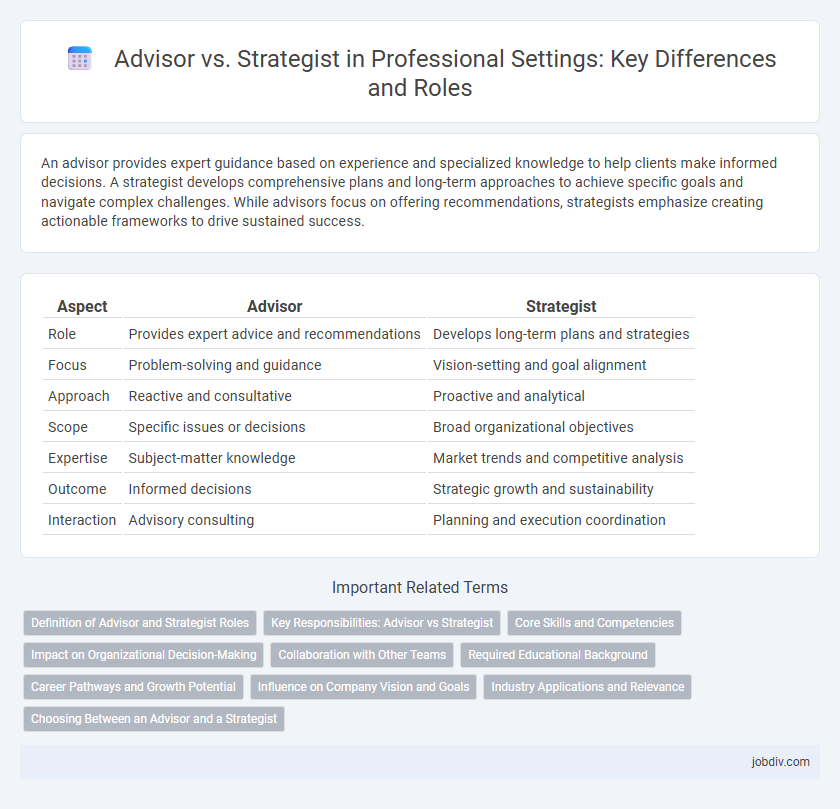An advisor provides expert guidance based on experience and specialized knowledge to help clients make informed decisions. A strategist develops comprehensive plans and long-term approaches to achieve specific goals and navigate complex challenges. While advisors focus on offering recommendations, strategists emphasize creating actionable frameworks to drive sustained success.
Table of Comparison
| Aspect | Advisor | Strategist |
|---|---|---|
| Role | Provides expert advice and recommendations | Develops long-term plans and strategies |
| Focus | Problem-solving and guidance | Vision-setting and goal alignment |
| Approach | Reactive and consultative | Proactive and analytical |
| Scope | Specific issues or decisions | Broad organizational objectives |
| Expertise | Subject-matter knowledge | Market trends and competitive analysis |
| Outcome | Informed decisions | Strategic growth and sustainability |
| Interaction | Advisory consulting | Planning and execution coordination |
Definition of Advisor and Strategist Roles
An advisor provides expert guidance and recommendations based on specialized knowledge to support decision-making processes within organizations. A strategist focuses on formulating long-term plans and tactics that align with business objectives to drive sustainable growth and competitive advantage. Both roles require analytical skills, but advisors largely concentrate on problem-solving and expertise sharing, while strategists emphasize vision development and strategic execution.
Key Responsibilities: Advisor vs Strategist
Advisors provide expert guidance based on specialized knowledge and experience, focusing on assessing risks and offering tailored recommendations to support decision-making. Strategists develop long-term plans by analyzing market trends, competitive landscapes, and organizational goals to align resources and initiatives for sustainable growth. The advisor's role centers on delivering actionable insights, while the strategist emphasizes the creation and execution of comprehensive strategies to achieve objectives.
Core Skills and Competencies
Advisors excel in providing expert guidance and actionable insights by leveraging deep industry knowledge and strong communication skills. Strategists focus on long-term planning, critical thinking, and data analysis to develop comprehensive plans aligned with organizational goals. Both roles require adaptability, problem-solving abilities, and a collaborative mindset to effectively influence decision-making processes.
Impact on Organizational Decision-Making
Advisors provide specialized expertise and insights that inform leadership, enabling more accurate risk assessment and opportunity evaluation during organizational decision-making. Strategists drive long-term vision by designing frameworks and setting priorities that align resources and actions with business goals, ensuring sustained competitive advantage. Their combined impact enhances both tactical responsiveness and strategic coherence, optimizing overall organizational performance.
Collaboration with Other Teams
Advisors facilitate collaboration by offering specialized insights that align with team objectives, ensuring informed decision-making across departments. Strategists drive cross-functional initiatives by creating integrated plans that bridge diverse expertise and promote unified goals. Both roles enhance interdepartmental synergy, but strategists emphasize cohesive execution while advisors concentrate on expert guidance.
Required Educational Background
Advisors typically require a strong foundation in specific fields such as finance, law, or career counseling, often holding degrees like a Bachelor's or Master's pertinent to their area of expertise, along with relevant certifications. Strategists generally need advanced education in business administration, management, or strategic planning, commonly possessing an MBA or equivalent qualifications emphasizing analytical and leadership skills. Both roles benefit from continuous professional development, but strategists often demand a higher level of formal education focused on complex problem-solving and long-term organizational growth.
Career Pathways and Growth Potential
Advisors typically provide expert guidance based on specialized knowledge, supporting decision-making processes in career development, while strategists focus on crafting long-term plans to drive organizational success and personal advancement. Career pathways for advisors often lead toward roles such as senior consultant or subject matter expert, emphasizing deep expertise and mentorship, whereas strategists may progress into executive leadership positions, highlighting skills in innovation and strategic planning. Growth potential in advising is closely tied to industry knowledge and client relationships, whereas strategists expand through broader business acumen and impactful decision-making.
Influence on Company Vision and Goals
Advisors provide expert guidance grounded in experience to shape company vision and inform strategic decisions, ensuring alignment with industry standards and market realities. Strategists focus on developing and executing long-term plans that drive organizational goals, integrating insights from advisors to refine competitive positioning and operational priorities. Both roles influence company vision, with advisors offering targeted expertise and strategists translating guidance into actionable business outcomes.
Industry Applications and Relevance
Advisors provide expert guidance tailored to specific industry challenges, offering actionable insights based on extensive experience and market knowledge. Strategists focus on long-term industry trends and competitive positioning, creating comprehensive plans that drive sustainable growth and innovation. Both roles are essential in sectors like finance, technology, and healthcare, where adaptive strategies and informed decision-making are critical for success.
Choosing Between an Advisor and a Strategist
Choosing between an advisor and a strategist depends on the scope and nature of your business needs; advisors provide expert guidance on specific issues, offering tailored recommendations based on specialized knowledge. Strategists focus on long-term planning and overarching goals, developing actionable frameworks to drive sustainable growth and competitive advantage. Assessing whether immediate problem-solving or comprehensive future-oriented strategies align better with your objectives is crucial in making the optimal selection.
Advisor vs Strategist Infographic

 jobdiv.com
jobdiv.com